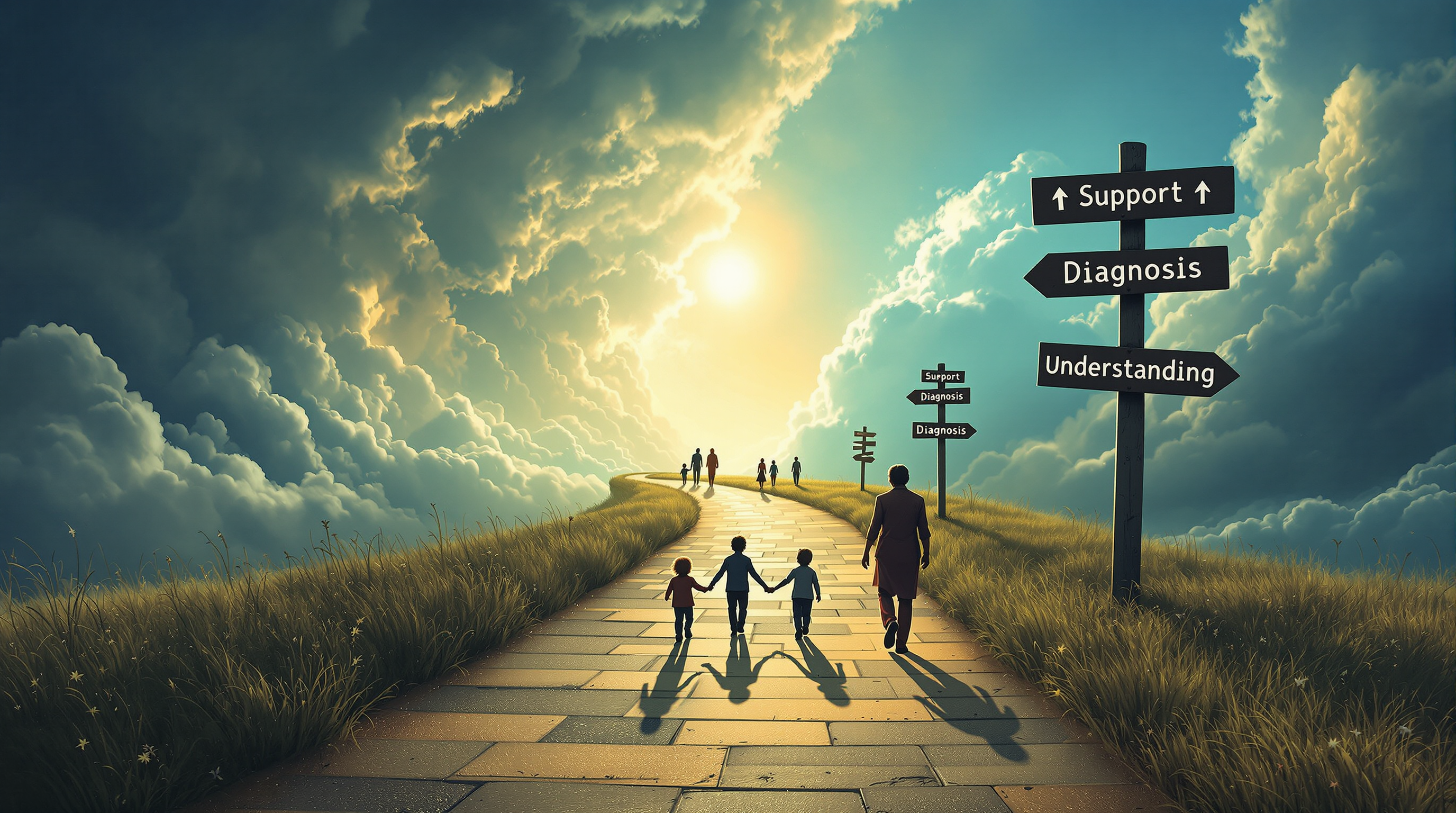Is Zoning Out a Sign of ADHD? Understanding the Subtle Symptoms of Inattention

We've all been there. You're in a meeting, and suddenly you realize you haven't heard a word for the last five minutes, your gaze fixed on a point beyond the speaker. Or perhaps you've seen a child's eyes glaze over mid-conversation, their mind seemingly miles away. Is this harmless daydreaming a momentary mental vacation, or could it be something more? This common experience of "zoning out" can sometimes be a subtle indicator of Attention-Deficit/Hyperactivity Disorder (ADHD), particularly the inattentive type. This article will explore the science and real-life meaning behind zoning out as it relates to ADHD, helping you understand when it might be more than just a fleeting thought. If you've ever wondered is zoning out a sign of ADHD, you're in the right place.
What Does 'Zoning Out' Really Mean?

In everyday language, "zoning out" describes a state where your attention drifts away from the present moment or the task at hand. You might appear awake and present, but your mind is elsewhere. This can manifest as daydreaming, staring blankly, or simply not processing what's being said or done around you.
While everyone daydreams occasionally, there's a key difference between this and the kind of attention lapses often seen in ADHD. Occasional daydreaming is often voluntary or a brief escape from boredom. However, when zoning out is frequent, unintentional, and disruptive, it might stem from underlying executive function challenges. Executive functions are a set of mental skills that include working memory, flexible thinking, and self-control – all crucial for maintaining focus. In individuals with ADHD, these functions may not operate as efficiently, leading to difficulties in sustaining attention.
Zoning Out and ADHD: The Connection

Attention-Deficit/Hyperactivity Disorder (ADHD) is a neurodevelopmental condition characterized by persistent patterns of inattention and/or hyperactivity-impulsivity that interfere with functioning or development. While hyperactivity is often the stereotypical image of ADHD, many individuals, especially those with inattentive ADHD (formerly known as ADD), primarily struggle with attention regulation. For them, zoning out is a hallmark ADHD symptom.
So, why does this happen? Research suggests that ADHD brains may manage stimuli, boredom, and focus differently.
- Stimuli Processing: An ADHD brain might have difficulty filtering out irrelevant stimuli, making it hard to concentrate on one thing. Conversely, it might seek more stimulation when under-stimulated by a monotonous task, leading the mind to wander in search of something more engaging.
- Boredom and Focus: Individuals with ADHD often have a lower tolerance for boredom. Tasks that are not inherently interesting can quickly lead to a mental "checkout." Their brains are often described as seeking novelty and engagement, and when these are lacking, attention can falter.
- Coping Mechanism: Sometimes, zoning out can be an unconscious coping mechanism. When feeling overwhelmed by sensory input, stress, or mental fatigue, the brain might "disconnect" as a way to manage the load. This isn't a conscious choice but rather an automatic response.
For someone with undiagnosed ADHD, this persistent zoning out can be a source of immense frustration and misunderstanding, both for themselves and those around them.
When Should You Be Concerned?
Everyone zones out from time to time. However, if you're wondering is zoning out a sign of ADHD? for yourself or someone else, here are some signs that it might be more than typical daydreaming:
- Frequency and Disruption: It happens frequently across various settings (school, work, home) and significantly disrupts tasks, learning, or conversations. For example, a child consistently misses instructions in class, or an adult frequently loses track during important work meetings.
- Unawareness: The person often seems unaware that they've zoned out until someone brings it to their attention. They might "snap back" with no memory of what was just said or what they were supposed to be doing.
- Accompanied by Other Symptoms: Zoning out rarely occurs in isolation if it's related to ADHD. Look for other common signs of ADHD in adults/children, such as:
- Persistent forgetfulness (e.g., misplacing items, forgetting appointments or chores).
- Difficulty with organization and planning.
- Trouble following through on instructions or completing tasks.
- Making careless mistakes.
- Difficulty sustaining mental effort on tasks that are lengthy or perceived as boring.
- Impact on Life: The zoning out and associated symptoms negatively impact academic performance, work productivity, relationships, and daily responsibilities. For instance, it might lead to poor grades, difficulties at work, or misunderstandings with family and friends who may perceive the person as uninterested or not listening.
The context is crucial. Occasional zoning out during a dull lecture is one thing; chronic, pervasive inattention that hinders daily life is another and warrants further investigation.
Other Conditions to Consider

While frequent zoning out is a strong indicator of inattentive ADHD, it's important to know that other conditions can also cause similar symptoms. These can include:
- Anxiety Disorders: Worry and racing thoughts can make it difficult to concentrate on the external world.
- Dissociation: This is a mental process where a person disconnects from their thoughts, feelings, memories, or sense of identity. It can sometimes manifest as feeling "spaced out."
- Sleep Issues: Chronic fatigue and sleep deprivation significantly impair attention and concentration.
- Learning Disabilities: Difficulties in specific areas of learning can lead to frustration and disengagement.
- Mood Disorders: Depression, for example, can cause a lack of interest and difficulty focusing.
- Auditory Processing Issues: Difficulty processing verbal information can look like inattention.
This is why self-diagnosis is not recommended. A thorough professional assessment is essential to distinguish between ADHD and other conditions, or to identify if co-occurring conditions are present.
What to Do If You Suspect ADHD
If the descriptions of zoning out and other ADHD symptoms resonate with you, for yourself or your child, the most important step is to seek professional guidance.
- Speak with a Professional:
- For children, start by talking to their pediatrician, who can provide a referral to a specialist like a child psychologist, psychiatrist, or developmental pediatrician. Educators can also provide valuable observations.
- For adults, consult with a psychologist, psychiatrist, or a primary care physician who is knowledgeable about adult ADHD.
- Track Symptoms: Before your appointment, it can be helpful to jot down specific examples of zoning out and any other concerning behaviors. Note:
- When and where do these episodes occur?
- How frequently do they happen?
- What is the impact on tasks, schoolwork, or relationships?
- Are there other symptoms like forgetfulness, disorganization, or impulsivity present?
- Keeping a journal of these patterns can provide valuable information for the assessing clinician.
- Reassurance: Remember, understanding is the first step to support. Whether it's ADHD or another underlying cause, identifying the reason for these challenges opens the door to strategies, treatments, and accommodations that can make a significant positive difference.
Awareness Leads to Support

So, is zoning out a sign of ADHD? The answer is yes, it certainly can be, especially when it's frequent, disruptive, and accompanied by other characteristic symptoms of inattention. While not every instance of a wandering mind points to ADHD, persistent and impairing zoning out is a valid reason to explore the possibility further.
Recognizing these more subtle symptoms is crucial for early identification and support, whether in children struggling at school or adults facing challenges in their careers and personal lives. Awareness and understanding pave the way for effective strategies and interventions that can help individuals manage their symptoms and thrive.
If you or someone you know frequently experiences zoning out along with other symptoms discussed, don't hesitate to speak with a healthcare provider. Understanding the "why" behind these experiences is the first and most empowering step towards getting the right support. If you found this information helpful, please consider sharing it with parents, educators, or anyone who might benefit from a better understanding of ADHD and its often-overlooked symptoms.
Feeling unsure if zoning out is more than just a momentary distraction?
If you or your child frequently loses focus or feels mentally “checked out,” it might be time to explore what’s underneath. Don’t wait for the struggles to grow; early insight can lead to better support and stronger outcomes.
Take the first step with Bonding Health’s ADHD symptom checker or explore our expert-backed tools, the Bonding Health App, designed to support emotional regulation and focus.


